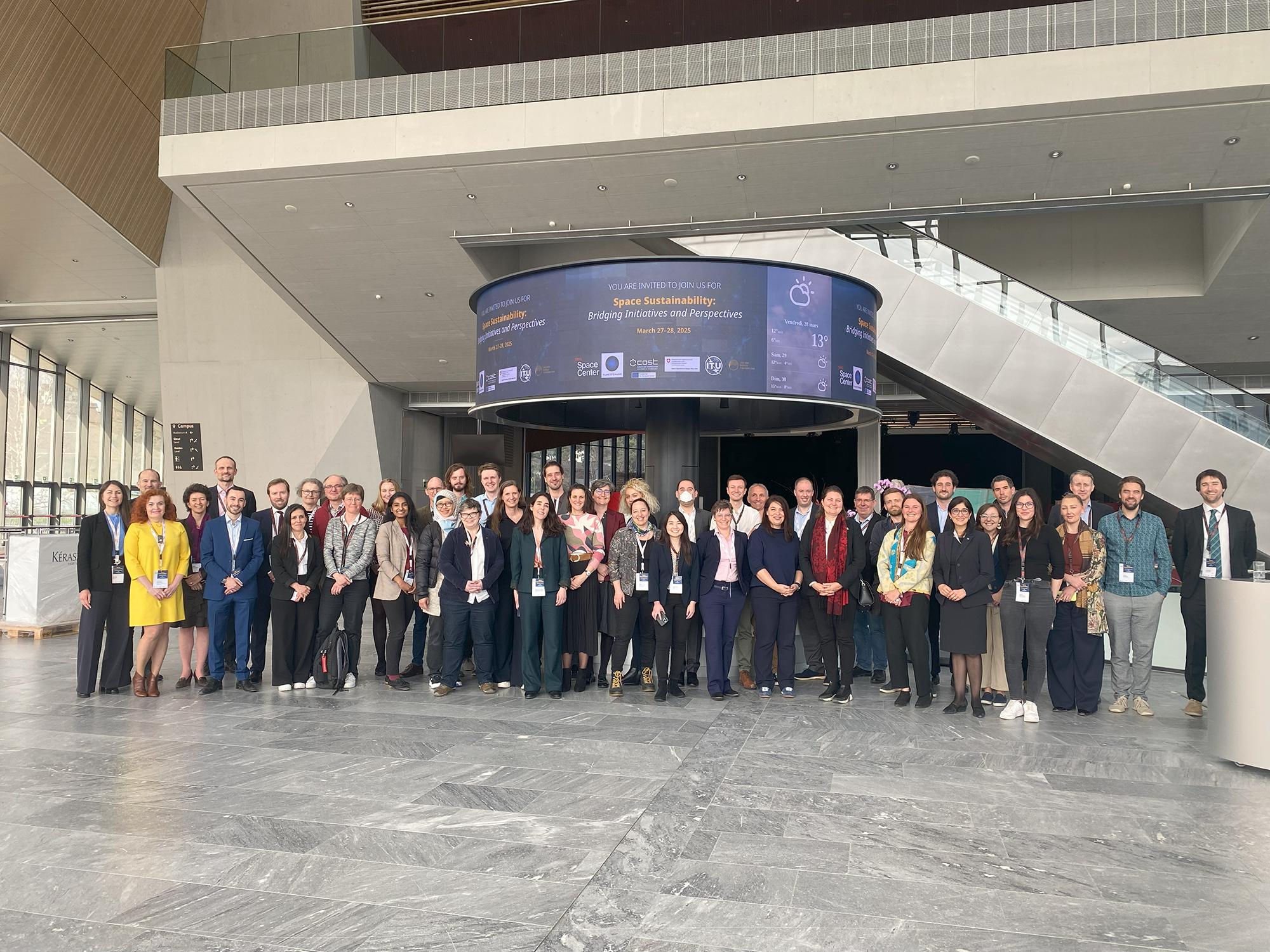Busy month of March for space sustainability at EPFL

© 2025 EPFL
During the last two weeks, EPFL space center has hosted and participated in a series of Space Sustainability Events.
Space Sustainability Course for professionals
Twelve professionals participated in a four-day course to learn more about Space Sustainability from teachers from EPFL, MIT, and IMS Space Consulting.

Main Highlights:
- Sasha Nick shared his vision on what it takes to have carbon neutral aviation.
- Claude Nicollier gave a talk on Space sustainability, from the Hubble Mission to the present time, and the need to protect our blue planet
- Lucie Poulet from the University of Clermont Ferrand received a scholarship, as part of the Karman Project scholarship program.
Feedback from a participant:
“I came to this course with the expectation to learn more about challenges associated with space debris, both from technical and governance perspectives. I came out with new perspectives, new tools, inspiring lectures and discussions that I’ll carry into my research and beyond.”
- Lucie Poulet, University Clermont Auvergne, Institut Pascal
Course content explored the policy and legality of space sustainability and looked at the metrics of space sustainability. The students explored technical solutions for space sustainability, mainly proposed by the ESA Zero Debris Technical Booklet and the EPFL Space Sustainability Design Handbook. The Space Sustainability Rating association presented their approach of incentivizing space actors for more sustainable behavior, and their lessons learned from a potential EU Space Label. The participants learned about ESA tools such as DRAMA and the mission index interface to evaluate the impact of their missions on the orbital environment, as well as the basics about Life Cycle Assessment. The course concluded by looking at the impact of EU Environmental, Social and Governance (ESG) regulations and how it applies to space companies, and the social aspects of the transition.
Related links
- https://espace.epfl.ch/education/space-sustainability-course-how-to-design-more-sustainable-missions/
- https://www.karmanproject.org/
- https://esamultimedia.esa.int/docs/spacesafety/Zero_Debris_Technical_Booklet.pdf
Space Sustainability - Bridging Initiatives and Perspectives

During the first days, the participants mapped different instruments at inter-governmental, national/regional, and inter stakeholder levels with three perspectives on the environmental, peace/security, and social equity/economic concerns to identify potential synergies, trade-offs and gaps in policy making, regarding space sustainability.
During the second day, more than 13 initiatives were presented, amongst them intergovernmental organisations such as UNOOSA, ITU, ESA but also industry-led initiatives like the WEF, academic projects from ERC grants and universities and NGOs like Secure World Foundation and the Space Sustainability Rating Association. The event concluded with two panel discussions about barriers and opportunities in information sharing for space sustainability and Space traffic coordination and about environmental impacts of space activities.
The participants gathered on Thursday evening for a reception hosted by the Federal Department of Foreign Affairs (FDFA), with opening remarks from Natalia Archinard, Ms Katarina Fuestiger and Ian Christensen from the Secure World Foundation.Space Fresco (fresque du spatial) with Matthieu Derrey
On the 8th May, Matthieu Derrey (Airbus Defense and Space + founder of Azurite), performed a space Fresco with 6 participants from EPFL. During 2h30 the participants created a fresco, understood the complex cause-consequence relationships between space activities and their environmental and socioeconomic impacts, gave a personal reflection about the problematic and derived actions at individual and community levels to improve the situation.
The fresco is still under development but almost ready to be used in companies / agencies / universities, and some participants already indicated an interest to include it for example in their in-boarding programs for students and new employees. The exercise may soon be offered to the rest of the EPFL Space Center staff and to future EPFL students.


European Space Debris Conference
From April 1st to 4th, the 9th European Space Debris Conference on Space Debris took place in the former German Parliament in Bonn. Main topics were the growing population of space debris, observations, debris re-entry, environmental implications, and orbit capacity. Technical solutions for remediation such as space debris removal and satellite end-of-life strategies were presented and the ESA short documentary “Space Debris: Is it a Crisis?” was released.
EPFL and UNIL contributed significantly to the conference with the following studies
- “Detection and Characterization of Space Debris Using VST/OmegaCAM Archival Data”, Elisabeth Rachith, EPFL.
Wednesday morning SSA-PAS: Space Surveillance Passive Optical 1 (detections) - “The Importance of Dark and Quiet Skies in Swiss Astronomy and the dialog with the space industry”, Emmanuelle David, EPFL.
Thursday Morning- Economics Legal and Policy - Initiatives - “Leveraging light-curve inversion for kinematic state estimation of uncooperative targets”, Francesco Renis, Politecnico di Torino, Master student with CVLAB. Thursday Morning- SSA-PAS: Space Surveillance Passive Optical 2 (techniques)
- “Statistical Inference on the Miss Distance Compared to Collision Probability for Conjunction Analysis”, Soumaya Elkantassi , Université de Lausanne.
Tuesday afternoon- Space Traffic Coordination Models
Join the EPFL Space Center at the next Sustainable Space Hub coffee on May 21st to learn more about the highlights from the European Space Debris Conference and follow the announcement of exciting student projects in space technologies and space sustainability available for the next semester!
